Founded in 1902 by Benjamin Russell, Russell Athletic initially focused on women's and children's knit shirts, making a significant mark in the fashion industry. Their groundbreaking creation of the first cotton jersey in the 1920s led to the development of the modern sweatshirt, a staple in casual fashion. By the 1960s, they had established themselves as the largest manufacturer of sports apparel in the U.S., blending style with functionality. Their innovative spirit continued with the introduction of Pro Cotton fabric in the 1990s and the popularization of hooded sweatshirts in the 2000s. Acquired by Fruit of the Loom in 2006, the brand remains dedicated to community engagement and the pursuit of athletic excellence, paving the way for future fashion-forward developments. Exciting new trends await you ahead.
Founding and Early Development
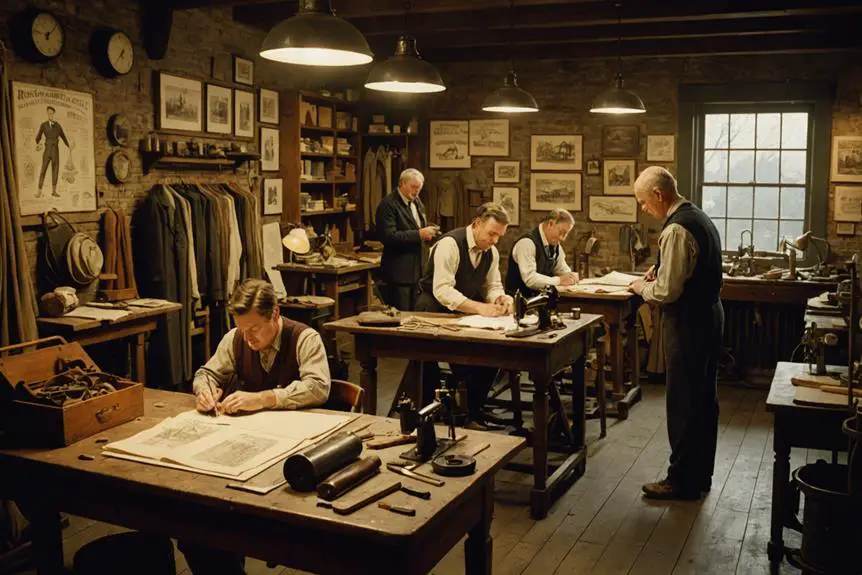
In 1902, Benjamin Russell launched Russell Athletic in Alexander City, Alabama, focusing on a niche that catered primarily to women's and children's knit shirts. This founding marked the beginning of a significant venture in athletic wear, as Russell recognized a gap in the market. Operating with just 10 sewing machines and 8 knitting machines, the initial factory laid a robust foundation for future manufacturing.
By the 1920s, the company innovated with the creation of the first cotton jersey, which would eventually evolve into the sweatshirt that is commonly recognized today. This development was pivotal, as it signaled Russell Athletic's commitment to enhancing comfort and performance in athletic apparel.
In the 1930s, the brand expanded its offerings to encompass a full line of athletic wear, including uniforms tailored for various sports. The introduction of the all-cotton practice football jersey in 1930 exemplified this growth. A major turning point occurred in 1932 when Russell Athletic acquired Southern Manufacturing Company, further solidifying its position in the athletic apparel market. This strategic move allowed for an expanded product range, establishing the brand as a key player in the industry.
Innovations in Athletic Apparel
Throughout its history, Russell Athletic has consistently pushed the boundaries of athletic apparel innovation. From the introduction of all-cotton practice football jerseys in the 1930s, you can see how the brand shifted from traditional wool to cotton, enhancing both comfort and durability. The development of the ribbed neck sweatshirt during this era addressed the discomfort athletes faced, solidifying Russell's position as a leader in sports apparel.
In the decades that followed, the company revealed the exclusive Pro Cotton fabric, showcasing its commitment to quality innovations. This dedication allowed Russell Athletic to evolve beyond strictly athletic wear, introducing hooded sweatshirts that appealed to a wider audience, merging sports apparel with contemporary fashion trends.
| Year | Innovation | Impact |
|---|---|---|
| 1930 | All-cotton jerseys | Enhanced comfort and durability |
| 1930s | Ribbed neck sweatshirt | Improved athlete comfort |
| 1990s+ | Pro Cotton fabric | Elevated quality in athletic clothing |
| 2000s+ | Hooded sweatshirts | Blended sports apparel with fashion |
Russell Athletic has maintained its reputation as a pioneer, continuously adapting to meet the needs of athletes and evolving fashion trends.
Expansion and Market Leadership
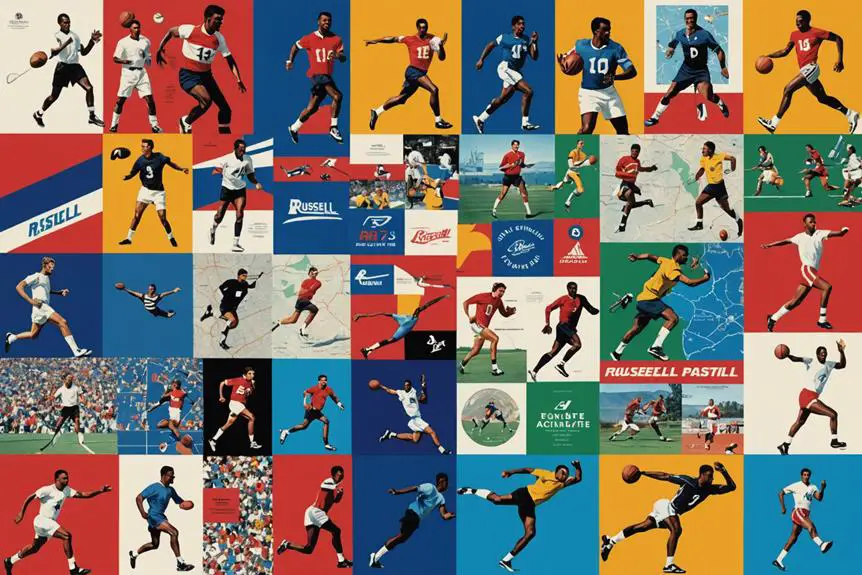
Russell Athletic's commitment to innovation laid a solid foundation for its impressive growth and market leadership in the athletic apparel industry. By the 1960s, you could see Russell emerging as the largest manufacturer of sports apparel in the United States, showcasing significant market dominance. This trajectory took a significant turn in 1973 when the company rebranded as Russell Corporation, signaling the beginning of its international expansion.
A pivotal moment came in 1992, when Russell secured a five-year contract as the exclusive producer of Major League Baseball (MLB) uniforms. This contract not only reinforced its leadership position but also enhanced its competitive presence in the athletic apparel market. Through strategic licensing agreements, Russell expanded into global markets, with Europe emerging as its largest international market via Future Brands Ltd.
Additionally, operations in Australia, Japan, and South Africa further solidified Russell Athletic's competitive presence, allowing it to adapt to diverse consumer preferences. This international expansion and proactive approach to partnerships have been essential in maintaining Russell's market dominance, making it a key player in the global sportswear industry.
Community Engagement and Recognition
Engaging with communities has been a cornerstone of Russell Athletic's identity, reflecting its dedication to fostering teamwork and support among athletes. Since launching the "Together We R" campaign in 2011, Russell has emphasized the importance of community engagement, promoting a sense of belonging among athletes. This initiative aligns with their ongoing efforts to support high school athletes through programs like the "Fight Like Dylan" award, which honors those who display remarkable perseverance in the face of adversity.
In 2015, the "Team On" campaign further championed high school team sports, reinforcing the significance of participation in athletic activities. These initiatives not only uplift individual athletes but also contribute to the broader community, showcasing Russell's commitment to impacting local economies through sponsorships and outreach.
Moreover, Russell Athletic's focus on sustainability initiatives within the athletic apparel market highlights its recognition as a responsible corporate citizen. Ranked 5th among apparel companies by Fortune Magazine from 1986 to 1996, the brand's impact in the industry is undeniable. By continuously engaging with communities, Russell Athletic cultivates a legacy of teamwork and resilience that resonates deeply with athletes and fans alike.
Legacy and Future Directions
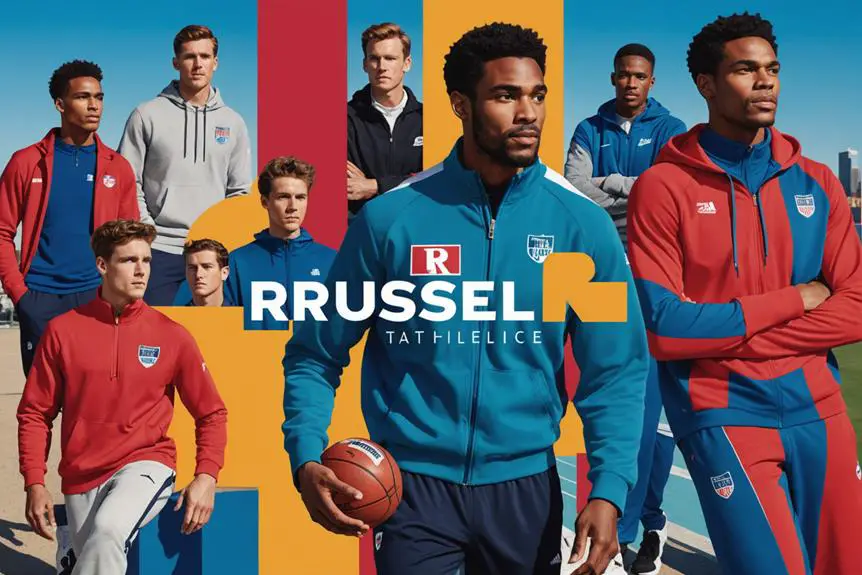
A century of heritage and innovation shapes Russell Athletic's legacy, marking its place as a pivotal player in the sports apparel industry. As you explore its journey, you'll notice how the company's commitment to quality and community values has been unwavering since its inception. Following its acquisition by Fruit of the Loom in 2006, Russell Athletic has not only preserved its rich heritage but has also embraced future growth strategies that focus on adaptability and modern trends.
The "Together We R" campaign showcases a dedication to teamwork among athletes, reinforcing the brand's commitment to sportsmanship and community engagement. Similarly, the "Fight Like Dylan" award embodies the spirit of perseverance, recognizing high school athletes who mirror the resilience that Russell Athletic stands for.
Looking ahead, Russell Athletic is poised for continued innovation in sports apparel, ensuring that its products remain relevant while honoring its legacy. By fostering a skilled workforce and emphasizing core values, the company is set to navigate the evolving landscape of athletic wear, blending tradition with modern demands to inspire future generations of athletes.
Frequently Asked Questions
What Is the History of Russell?
When exploring Russell's history, you'll find it began in 1902, evolving from producing undergarments to pioneering athletic wear like the cotton sweatshirt. This journey highlights innovation and adaptation, shaping the sports apparel industry considerably.
Who Owns the Russell Athletic Brand?
You'll find that Berkshire Hathaway owns the Russell Athletic brand, having acquired it in 2006. This ownership provides substantial financial resources, enabling the brand to thrive in the competitive athletic apparel market.
How to Tell if Russell Athletic Is Vintage?
To determine if Russell Athletic is vintage, look for the original "Eagle R" logo, check for "Made in the USA" tags, and assess the fabric quality and stitching for durability indicative of earlier manufacturing standards.
When Did Russell Go Out of Business?
Russell Athletic hasn't gone out of business; it's continued operating under Berkshire Hathaway. You'll find the brand adapting to market challenges, ensuring its presence remains strong and innovative in the competitive athletic apparel landscape.
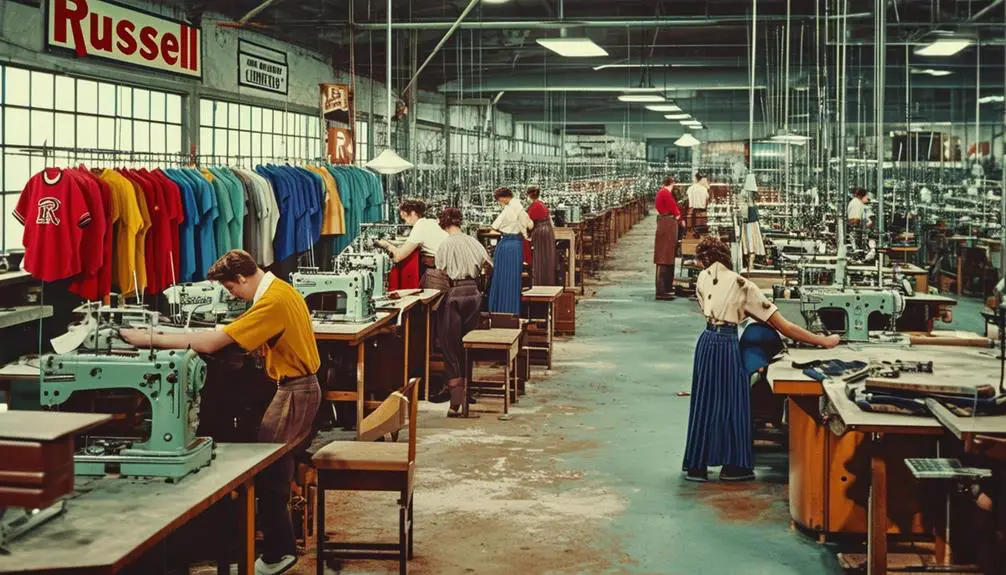


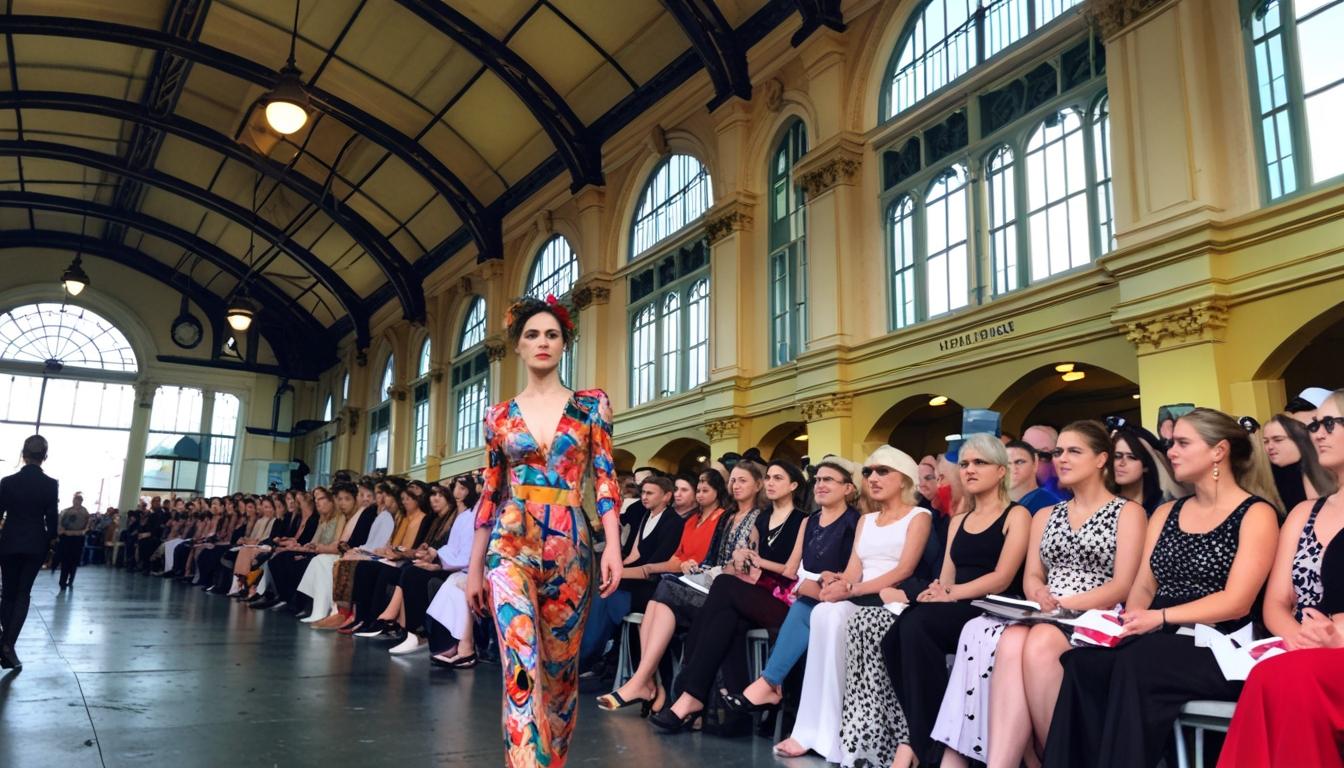

Your point of view caught my eye and was very interesting. Thanks. I have a question for you.